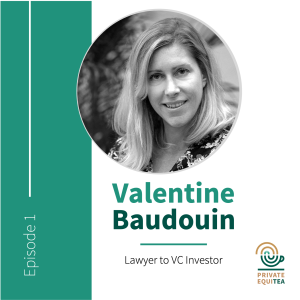Introduction
I am Antoine Sage and I would like to invite you to share a cup of tea with the personalities of the private equity (PE) ecosystem. Each guest talks about their expertise, their background, and their vision of private equity. To each his own cup of tea – GPs, LPs, regulators, providers, and partners, with the Private Equity podcast everyone is welcome as long as they enrich our vision of PE.
To listen to the podcast in French, click here.
Keep reading for the translated English version.
Private EquiTEA : Valentine Baudouin – Lawyer to VC Investor
Antoine: For the first episode of Private EquiTEA, we have the pleasure to welcome Valentine Baudouin.
Valentine: Enchanté and delighted to be here.
Antoine: Valentine, you career translates to one of rare diversity. After starting out as a lawyer, in Paris, in the capital market, you transitioned to fund management at Optimal Gestion and then at Citi in Geneva. You then joined Hubert de Vauplane at Kramer Living in Paris, where you accompanied multiple innovative projects in finance. Attracted by direct investments, you become a partner of the VC fund, Founders Future. You are recognized as one of the five most influential French women and among the ten women to follow in tech in 2021 by SITA. A warm welcome, Valentine.
Valentine: Thank you for this introduction, I do not know if I deserve this praise.
Antoine: Valentine, looking at your background, how would you define Private Equity?
Valentine: That is a question that is complicated for me. I am neither a career investor (fund manager) nor a private equity lawyer. If anything, I have done many different things. The industry I know best as an investor (fund manager) in Private Equity, is Venture Capital; on the other hand, I know Private Equity better as a lawyer. If I had to answer as to how I define it, at least in my career, it is the reunion of men and women. And more precisely the diversity and richness of the different models. You have as many private equity investors as you have different funds. And in this unlisted asset class what they do is ultimately finance the real economy with means that are adapted to each stage of the company.
Antoine: Do you have a memory of a very strong or unusual moment in this industry that you would like to share with us?
Valentine: It’s not necessarily going to be in private equity, but it will be in fund management. So, when I left Gide, a French law firm with a focus on the capital markets, I left for Geneva and joined Optimal Investment Services, which was the hedge fund arm of Santander Bank at the time. I arrived in Geneva not knowing much about Swiss law and hedge funds. I just understood that it was a big hedge fund and that I happened to speak Spanish. And so, I think that’s why they hired me, only because I spoke Spanish as it was one of the languages at Optimal. So, I started my first day just a few weeks before the BLMES fraud, the fraud of Bernard Madoff’s broker-dealer company, was discovered.
So, I finally ended up after just three or four weeks with a few billion euros impacted as Optimal was a fund of funds. Therefore, a big part of our activity was exposed to one of the biggest frauds and Ponzi schemes that ever existed. Not only that, but we were also in 2009 with the liquidity crisis, where Optimal was a hedge fund. And most of the funds were invested in what is called the side pocket, where you block the “redemption”.
So once again, I find myself in a world I do not know, with a huge fraud to handle. Of course, there was an incredible legal director, who taught me my job. Almost all our funds had the same name, in which we had 80% “redemption” requests while the assets in which we had invested were blocked and frozen.
So, it was a very strong moment. And I often say that I learned my trade at Optimal, as I faced all the worst things that could happen, from an operational, legal, and litigation point of view, in those two years.
Antoine: And in terms of investor relations?
Valentine: Also, in terms of investor relations. I was in the early years of my career, and I learned how to take decisions. I learned a tremendous amount from the people who were around me. It was going to take horror decisions, so switching from board meeting to board meeting and saying that I must split – so I was not going to treat my retail investors the same way as my institutional investors. I am going to reimburse my retail investors in shares, but I’m also going to take my institutional investors on board so that we can recover the maximum from the fraud. Optimal, in any case, sold the claim against BLMES, the broker-dealer company of Bernard Madoff, at 74 cents on the dollar.
This is what I learned at Optimal finally. And for Madoff, I still have some files for some people with the Madoff victim fund. It was this fighting spirit and the do not give-up attitude of the people that surrounded me that made it possible for Optimal to put behind it and handle the Madoff fraud – having recovered something for almost all the investors. And 74 cents on the dollar, in the end, I think that it is relatively honourable.
Antoine: In fact, we can consider this as a good performance considering the slump that we are referencing.
Valentine, where does your passion for accompanying entrepreneurs come from, both as business angels and as a partner of a VC fund?
Valentine: Even though, on paper, it looks like I’ve changed jobs, I always say that I don’t have the impression that I did. My DNA is the DNA of a lawyer, meaning it is of advice. Finally, it is to know that we are in the sidecar and that we do not have two hands on the steering wheel. It is to be beside and to advise to the best of our capabilities. And this passion becomes more than a passion, it is my DNA. So as business angels, it’s to accompany the entrepreneur at best during their first year of the company. When it is a question of my profession of accompanying emerging managers or funds that are being created, it is the same. It is a group of men and women who had a project that they wanted to get started. My role is to advise them, and to try to accompany them as best as possible. And in any case, this is something that I did as a lawyer, that I did at Optimal, and that I am doing now as an investor. What is certain is that I take pleasure in what I do and that is the main thing. I don’t know if it is a passion, but what counts is to be happy from 9 am to 9 pm, and I’ve always been in each of my activities.
Antoine: Wonderful. In the more difficult phases and as a VC we know it can arrive, does this give you a particular quality? Perhaps the distance allows you to better accompany during difficult phases?
Valentine: So, these difficult phases. I’m someone who comes from a sidecar background, so I have no frustration with having my hands on the wheel. I’ve always been a consultant and it’s a special role. That is, as I often say, to be in the kitchen, and to advise people. We are quite close in the apartment; we are not only in the living room but also in the kitchen. But I’ve never done it myself, I’ve never been an entrepreneur so I don’t have this frustration and I don’t think I could do better than others. What I notice, in any case, in the entrepreneurs that I accompany there are some frustrations. And that’s true, there’s either a great solitude, in the end, to say that they’re the ones who have both hands on the wheel and they’re the ones who do it in the end. In any case, especially in the job I do, in venture, the first few years the company must shine a little. Finally, there are fundraisings, there must be leadership with respect to the employees, and it is often necessary for the CEO to show leadership to the co-founders and investors. And that’s what I try to do, and I certainly do it badly from time to time because it’s quite difficult and in fact, it’s more to an entrepreneur or to entrepreneurs that you should ask the question. Finally, it’s to be a good ear and to be there. And that’s it when you are in a cap table. I think that when you invest, you have a certain responsibility in any case. So, creating value is one thing, but it is most important not to destroy it. That’s it. And I think that one of the ways of not destroying value is to try to accompany the best and to be there, at least when people need it.
Antoine: Is being here, being an entrepreneur? Isn’t it having the responsibility of setting up a management company or working with a third-party management company, raising funds, having investors, and being accountable, isn’t that a bit of an entrepreneurial activity too?
Valentine: So, it’s a business creation activity, but I don’t think I could compare it to the activity of an entrepreneur. The people I finance for a whole bunch of reasons, it’s that we work by vehicle, we work by batch, so it is very different. When you raise an investment fund, the model is still to collect a certain number of assets under management, and then you’re guaranteed to have revenues linked to what you’ve done during the fundraising period for almost eight years. So, it’s a model that is very, very, very different from 99% of entrepreneurs who are going to conquer a market, where you are in this growth phase, etc.
So, I find in any case in terms of the business model that cannot be comparable to the entrepreneurs I fund. And this is something that, from time to time, in any case, can create iterations as they say in the press or elsewhere. Indeed, between the risk of a VC and the job of being an entrepreneur, it is, still, concretely to take the risk. And for entrepreneurs only in finance. But as an investment fund, your job is to spread your risk, by diversifying the portfolio. The entrepreneur puts his entire life into a project with a business model on which he must bring in new customers every day. Once the fund is closed, so it has made its final closing, you have a revenue stream that is assured for the next few years. So, there you have it. Of course, it’s business creation, it’s working with service providers, and it’s reporting to investors – so you’ve got some similarities, but I don’t think it can be compared.
Antoine: That seems fair to me. Valentine, you are publicly involved in the transmission and support of innovation both within a professional association and by lecturing at the IEP Paris. How do you manage to strike the right note in terms of communication, discretion, and balance between investment and entrepreneurial support?
Valentine: I believe what counts in the profession of an investor is the success of the entrepreneurs. What I try to do, in any case, is to always pass on the communication, at least around entrepreneurs, versus an embodied communication between investors. It’s the success of men, women, and companies, and not only the success of future fundraising, but also commercial successes, and exemplary successes that makes me happy to do my job, as I told you before from 9 am to 9 pm. So, I think that the right balance, at least the way I see it, is always to remember that we are in the sidecar. And finally what counts is precisely that, it is to tell ourselves that because it is the principle of financing a “PowerPoint”, it is to be part of an entrepreneurial adventure and that it is the entrepreneur who gives us the chance to do it and it is really at that level that we must try to put this prism.
So afterward, I know that there is a whole communication around that, how it should be done. And it’s just that it comes up quite often and particularly right now when you’re a woman, and it’s a subject precisely to say to yourself, should you communicate or not, but I would keep this prism there and what counts, it’s the companies in which you invest, the entrepreneurs in which you invest. You should talk to them, and not me.
Antoine: Nevertheless, can we talk a little bit about you, at least about your vision?
Valentine: Of course.
Antoine: What is your vision of the private equity asset class in ten years? And in your opinion, are there any major issues that this industry will face in the next ten years?
Valentine: In private equity, there are issues that for me are general in the unlisted asset class regardless of the stage. And you have specific issues that I’m a little more familiar with, which are in Venture. I was at Optimal for four or five years, so I started my career in hedge funds and it’s quite apt to say that now the hedge fund market is a bit different from 2009 when it was an asset class that was far superior to private equity at one time. And we can see that for a lot of reasons, it’s kind of losing momentum. One of the challenges of hedge funds was precisely the big challenge of how to make these strategies a little more transparent. And Madoff is a bit of a culmination of this. In fact, the AIFM directive is a big directive that was taken in correlation with what happened with the Madoff fraud.
I think that there is an issue in the unlisted asset class, which is going to be precisely that of understanding the transparency and having a challenge of reporting which is much more focused on sharing information between institutional investors or investors in general, the companies in which you invest. So, the activity of the managers of these funds, who are not only intermediaries, and I include myself in it, but also intermediaries between institutional or private money and the real economy. We’ve seen a whole bunch of things in recent months, even SFDR is an example. There are going to be a certain number of major trends, I think, around this in the next few years and which will be a challenge as it’s not the same thing to apply SFDR in a mature company as it is to apply SFDR when you’re like me, and you invest in a PowerPoint. So, it’s different things, but in this unlisted asset class, we have to treat it as a major issue and to apply it in a macro way and apply it in a micro way at the stages of private equity investment. it’s an issue, including for a certain number of players like us. This is a challenge, even for several players like us, who do Venture – when you are on Powerpoint, you cannot reduce negative externalities because, by definition, your company has no footprint and it is better to focus on how you are going to create positive externalities, and therefore have an impact. For example, SFDR is designed more to reduce the negative externalities than the creation of a positive impact. So, you have these major trends which, for me, are fairly generic.
If we focus on my sector in the early stage, one of the big issues, for me at least, maybe not in ten years, but right now is recruitment. We talk a lot about valuations, which are important, but I’m not a mind reader. What is certain is that when billions of dollars are poured into tech, there is a daily tension in recruitment. And in particular, tension in recruitment in the small companies that I finance. These companies that have just been created a few months ago, do not have a strong employer brand, and are competing with other companies that have just raised hundreds of millions of euros.
Today, there is a lot of innovation, at least, in Venture. Once again, recruiting men and women who are going to make up the company, and in particular, your first employees is one of the main issues for me.
Antoine: And to also convert those who are not entrepreneurs to entrepreneurship, is that what you do at Sciences-Po?
Valentine: Not necessarily. There is an entrepreneurial creation, at least in France that I know that is making the ecosystem mature. That is to say that in my generation when you wanted to be a lawyer, you wanted to be a trader. But now, when you go to a business school or a Polytechnique, you want to be an entrepreneur. There has been a change. And it happened in a few years because I didn’t finish my studies that long either. So, there you have it, now there are a lot of people who want to be entrepreneurs. I think there has been an incredible success in changing perspectives. With a richer ecosystem, that is more mature, there is financing, financing from foreign funds that is happening I find. I remember, I made a video for the BPI, not even five years ago, thanks to Olivier Rameil of the BPI, who was working in a BPI fund that had to co-invest with business angels, meaning half public money and half private money. They had this initiative to make videos with a few business angels to say ah well, we need more. So, I made videos to say that many people can be business angels. Now in many rounds what happens is that the business angels are rather downgraded, that is to say, that there is a lot of money and finally the allocations that some people want to put are revised downwards. In four or five years, there have been many, many things that have changed. And so of course, in the classes that I give, it’s not necessarily to convert students to entrepreneurship but to inform them about my job as an investor, which at the end of the day are testimonials.
Antoine : Valentine, thank you very much for sharing with us the first tea of the Private Equity podcast and we wish you a lot of success in your new projects. See you soon.
Valentine : Thank you very much Antoine.
Antoine : Thank you Valentine.





